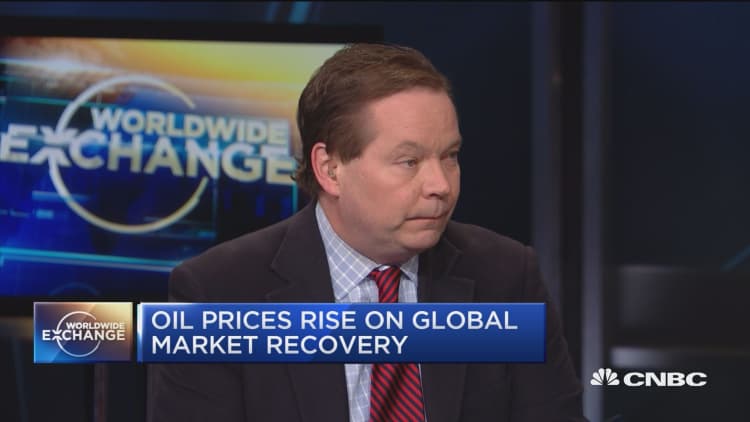
The oil market's rally toward 2018 highs broke down on Wednesday as U.S. crude stockpiles jumped, geopolitical tensions faded into the background and a firmer dollar put pressure on the commodity.
Futures extended early losses after the U.S. Energy Information Administration reported the nation's stockpile of crude oil jumped by 1.6 million barrels in the week through March 23. Stocks also jumped by 1.8 million barrels at the closely watched delivery hub for U.S. crude located in Cushing, Oklahoma.
Inventories at Cushing "might be rebuilding rather rapidly, so that would be a big negative," said John Kilduff, founding partner at energy hedge fund Again Capital.
U.S. West Texas Intermediate crude futures sank more than 2 percent at the bottom of the session, drifting further from Monday's peak, which nearly established a new three-year high. The contract ended Wednesday's session down 87 cents, or 1.3 percent, at $64.38.
International benchmark Brent crude also extended losses, with the most heavily traded contract for June delivery also dropping by about 2 percent, before recovering slightly to trade down 71 cents, or 1 percent, at $68.75. The May contract, which expires on Thursday, was down 62 cents, or 0.9 percent, at $69.52.
The weekly EIA report was not all bad, according to Kilduff, who noted higher-than-usual activity at the nation's refineries and strong gasoline consumption, both of which boost demand for feedstock crude oil.
But the geopolitical tension and threats of supply disruptions in the Middle East that boosted oil prices somewhat receded as the week wore on.
Those tensions included the launch of rockets from Yemen into neighboring Saudi Arabia, the world's largest oil exporter, and saber-rattling from Saudi Crown Prince Mohammed bin Salman in the kingdom's long-simmering feud with regional rival Iran ahead of his U.S. visit.
"I think some of it is just the easing of geopolitical worries. That rocket fire from Yemen on Sunday night sent a shudder through the market," Kilduff said.
"With MBS here running around trying to cut deals, it looks like they're not going to be focused on it right now," he added, using a nickname for the Saudi crown prince.

There was more bearish news lurking in EIA's report.
Weekly U.S. production figures from EIA showed American production continuing to tick higher to 10.43 million barrels a day, further cementing the United States' new role as the world's second-largest producer, behind Russia and ahead of Saudi Arabia.
Meanwhile, the nation's oil exports remain robust, creating a challenge to OPEC and Russia's output cuts aimed at shrinking global crude stockpiles. Weekly U.S. crude shipments remained roughly steady at just under 1.6 million barrels a day.
"The more oil we push out on the international market, the more that offsets the production cuts," said Gene McGillian, manager market research at Tradition Energy.
The 14-member oil cartel OPEC is partnering with Russia and other producers to keep 1.8 million barrels a day off the market through the end of the year. Earlier this week, Prince Mohammed told Reuters the agreement to coordinate production could last for 10 to 20 years.
The U.S. dollar also continued its rebound from five-week lows on Wednesday. The dollar and oil futures sometimes move in opposite directions. A stronger greenback makes dollar-denominated commodities such as crude more expensive to holders of other currencies.

— CNBC's Patti Domm contributed to this report.


